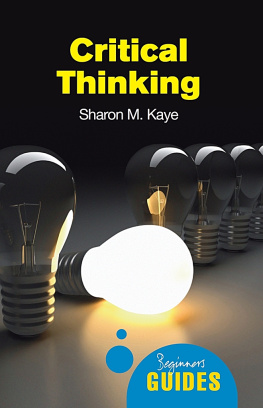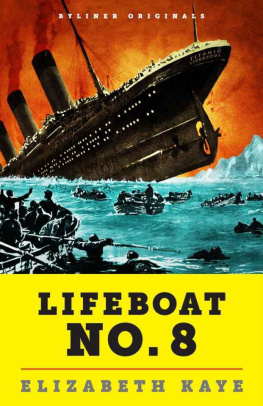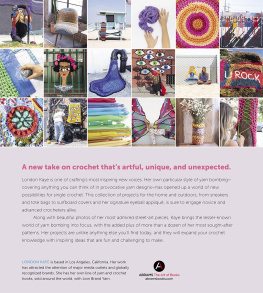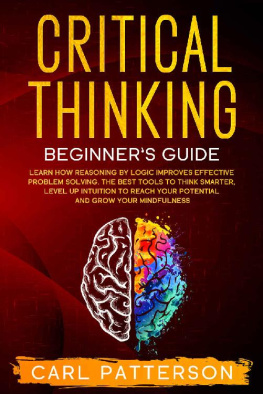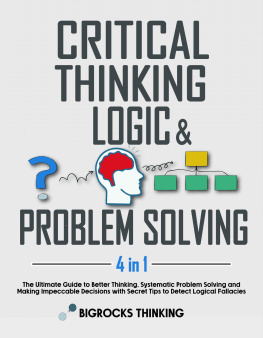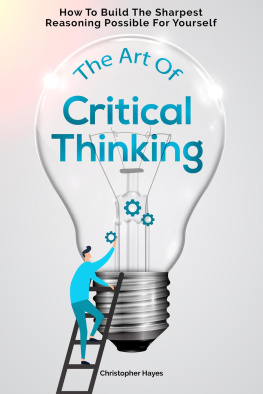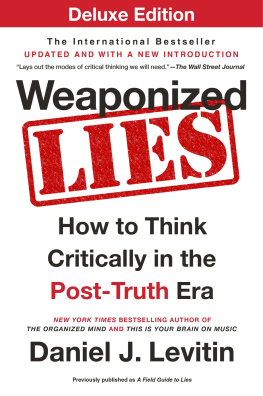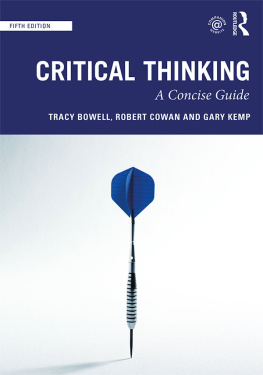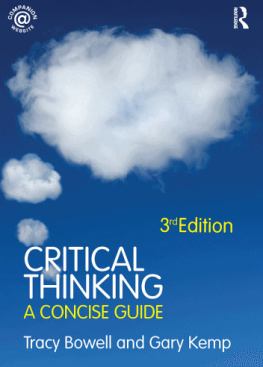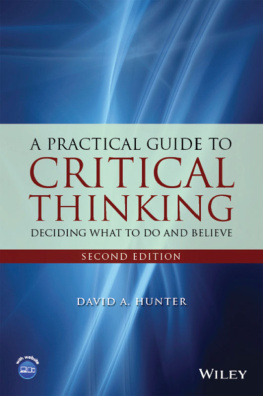Critical thinking
A Beginners guide
ONEWORLD BEGINNERS GUIDES combine an original, inventive, and engaging approach with expert analysis on subjects ranging from art and history to religion and politics, and everything in between. Innovative and affordable, books in the series are perfect for anyone curious about the way the world works and the big ideas of our time.
anarchism
anticapitalism
artificial intelligence
the bahai faith
the beat generation
biodiversity
bioterror & biowarfare
the brain
the buddha
censorship
christianity
cloning
crimes against humanity
criminal psychology
critical thinking
daoism
democracy
dewey
dyslexia
energy
engineering
evolution
evolutionary psychology
existentialism
fair trade
forensic science
genetics
global terrorism
hinduism
humanism
islamic philosophy
lacan
life in the universe
machiavelli
mafia & organized crime
marx
medieval philosophy
NATO
oil
the palestineisraeli conflict
paul
philosophy of mind
philosophy of religion
postmodernism
psychology
quantum physics
the quran
racism
religion
the small arms trade
sufism
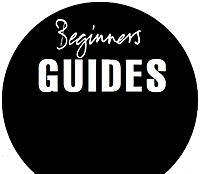

A Oneworld Paperback Original
Published by Oneworld Publications 2009
This ebook edition published in 2012
Copyright Sharon M. Kaye 2009
The right of Sharon M. Kaye to be identified as the Author of this work has been asserted by her in accordance with the Copyright, Designs and Patents Act 1988
All rights reserved
Copyright under Berne Convention
A CIP record for this title is available from the British Library
ISBN 9781851686544
ebook ISBN 9781780741475
Typeset by Jayvee, Trivandrum, India
Cover design by Simon McFadden
Oneworld Publications
185 Banbury Road
Oxford OX2 7AR
England
www.oneworld-publications.com
Stay up to date with the latest books, special offers, and exclusive content from Oneworld with our monthly newsletter
Sign up on our website
www.oneworld-publications.com
Preface
I will never forget my first logic class.
I am sitting in a large lecture hall at the University of Wisconsin in Madison. Outside the long, stately windows it is sunny and warm. I am surrounded by a hundred distracted students in jeans and tshirts.
Professor Ellery Ells is up on the stage telling us that logic is the law of thought.
I am riveted, but only because I am offended. How can this man have the nerve to stand up there and tell me there are limits on what can be true? Fancying myself a poet and an artist, I resist his every word. Surely creativity is more important than clarity. Imagination is the secret to happiness and it needs no rules.
My notebook from that course is filled with rebellious floral doodles and not a few unkind sketches of Professor Ells.
But thank God for university requirements. By the time I finished the course I understood: beauty is meaningless without structure, and logic is the most powerful structure ever conceived.
So now I wake to find that I have been teaching the basic logic skills known as critical thinking for over ten years.
I would like to thank my students over the years for trying to fight me the way I tried to fight Professor Ells. I would also like to thank John Carroll University for reducing my course load every semester so that I have time to write. Terry Bradley and Elizabeth Funk obtained permissions for all of the passages quoted in this book. I am grateful for their timely and effective work. Finally, I am grateful to my editor at Oneworld, Mike Harpley, for sound guidance throughout the process.
This book is dedicated to Tris and the rest of the gamesters. You all play a role in what follows.
SK
Introduction
Insight, untested and unsupported, is an insufficient guarantee of truth.
Bertrand Russell
Do you have opinions?
Of course you do.
Having opinions is how we define ourselves. Its how we forge alliances (I like that TV show, too) and its how we distinguish ourselves from others (That TV show is for idiots).
Young children may differ from their parents in terms of aversions (I hate green beans) and attractions (I love swimming). But it takes them a while to develop opinions that contradict their parents (This war is wrong). Having independent opinions is the first sign of growing up.
Breaking out of the parental mould is terrifying at first, but its also exhilarating. Teenagers often find it so exhilarating that they begin to express contrary views at every available opportunity and even to create conflict out of nothing when things get dull (Its a free country I can think what I want!).
Annoying as this can be, we have to admit that having independent opinions is actually an accomplishment. Considering how much our family, our friends, the media, the government, and religious institutions try to influence us, its amazing that anyone ever has an original thought at all.
And the fact that we have the right to think and say what we believe really is something to relish. Its one of the greatest triumphs of modern civilization. Our ancestors in the Middle Ages simply were not permitted to disagree with authority. Brave protesters throughout history slowly changed this for us. Tragically, there are still countries around the world today without the right to free speech.
Being able to express oneself is such a great thing that sometimes people make the mistake of thinking it is the final stage of intellectual maturity that once youve developed a unique and interesting point of view youre ready to face the world and all its challenges.
This is unfortunate. In fact, having opinions is just the beginning.
Because we live in an age of freedom, you dont have to defend your opinions. But dont you want to? If your opinions are more than just childish aversions and attractions, then you should be willing to take a stand for them.
Wherever you are, your point of view will give you opinions about the issues you face. But having opinions is not enough to be successful in what you do. You need to be able to transform your opinion into a position. The difference between an opinion and a position is that a position is supported by argument.
Anyone can make an argument. But lets face it: some arguments are better than others.
Next page
